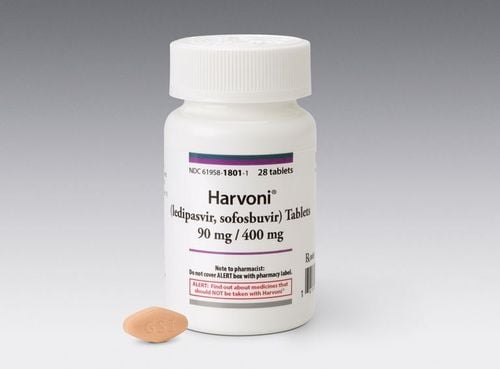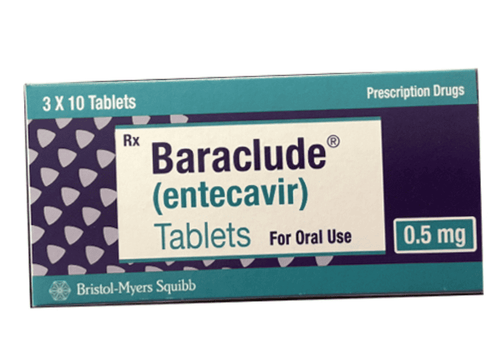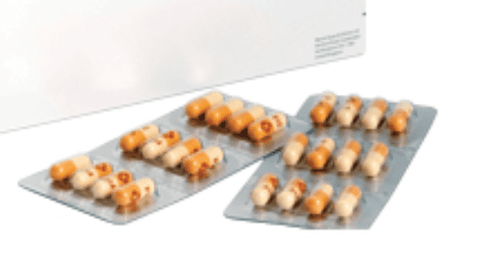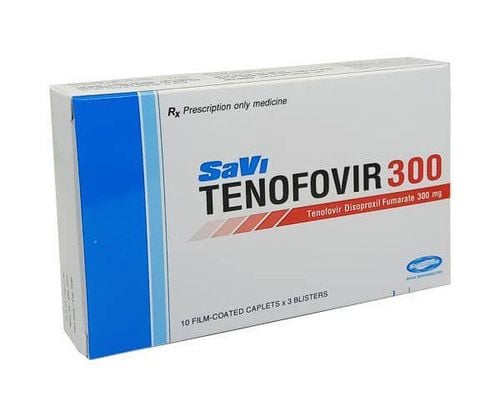This is an automatically translated article.
Antiheb is often used by doctor's prescription, to treat chronic hepatitis B, cirrhosis, decompensated liver disease, liver transplant or HIV infection,... To use Antiheb effectively In order to prevent the risk of adverse side effects, you should strictly follow your doctor's instructions regarding dosage, timing and usage.
1. What is Antiheb?
Antiheb belongs to the group of antiviral drugs, used in cases of hepatitis B virus (HBV) infection in both children and adults. Currently, Antiheb is researched, developed and manufactured by the Pharmaceutical & Medical Biomedical Enterprise (MEBIPHAR) Ho Chi Minh City - Vietnam in the form of tablets, each box includes 3 blisters x 10 tablets. .
Each Antiheb tablet contains the following active ingredients:
Main active ingredient: Lamivudine 100mg. Auxiliary excipients: Colloidal Silicon dioxide, Microcrystalline Cellulose, Talc powder, PVP and Magnesium stearate. In general, Antiheb is considered a useful solution for patients with chronic hepatitis B, cirrhosis, liver transplantation or immune system damage. To use Antiheb effectively and safely, you need to use it according to the regimen prescribed by your doctor.
2. What are the effects of Antiheb?
2.1 Uses of active ingredient Lamivudine Active ingredient Lamivudine is an antiviral drug that has a positive effect on hepatitis B virus in all tested cell lines. Normally, lamivudine will be converted to the triphosphate derivative (TP) by both infected and uninfected cells. It is estimated that the intracellular half-life of triphosphate is about 17-19 hours in the liver.
Lamivudine and Triphosphate act as substrates for Hepatitis B Virus Polymerase. When these active ingredients are incorporated into the DNA chain, they will prevent further formation in the DNA of the virus. Most Lamivudine will well inhibit the body's beta and alpha DNA polymerases. After oral administration, Lamivudine is rapidly absorbed from the gastrointestinal tract, with bioavailability ranging from 80 to 85% in adults. This active substance is usually eliminated mainly by the kidneys in unchanged form. However, the binding of Lamivudine to plasma proteins is rather low. On average, the systemic clearance of Lamivudine is approximately 0.3l/hr/kg and the elimination half-life is expected to take 5-7 hours.
2.2 Indications and contraindications to using Antiheb Currently, Antiheb is used by doctor's prescription to treat the following conditions:
Chronic hepatitis B. Cirrhosis or decompensated liver disease. Necrotizing hepatitis on biopsy. Damage to the immune system. Liver transplant. Combination of Antiheb with other antiretroviral drugs for the treatment of HIV infection. However, it is necessary to avoid arbitrarily using Antiheb for the following patients:
People with a history of allergy or hypersensitivity to the active ingredient Lamivudine or any of the excipients included in the drug formula. Children under 3 years old. Relative contraindications Antiheb for pregnant women or nursing mothers.
3. Instructions on dosage and how to use Antiheb effectively
Antiheb drug is made in the form of tablets, taken orally. You should take the tablet whole with a glass of water about 240ml, avoid drinking with stimulant drinks, carbonated water, alcohol, soft drinks, coffee or beer. In addition, you also need to strictly follow the dose of Antiheb recommended by your doctor to ensure safety during treatment.
Below is the dose of Antiheb for each specific patient:
Dose for adults and pediatric patients over 12 years old: Take 100mg/time/day. Dosage for pediatric patients from 3 to 12 years old: 3mg/kg body weight/time/day. Antiheb can be combined with other antiretroviral drugs to effectively treat HIV infection:
Dosage for adults and pediatric patients over 16 years of age weighing > 50 kg: Oral Lamivudine (150mg) in combination with Zidovudine ( 300mg)/time/ 12 hours. Dose for adults and pediatric patients over 16 years of age weighing <50kg: Oral Lamivudine (2mg/kg body weight) and Zidovudine (4mg/kg body weight) once every 12 hours. Dose for pediatric patients 12-16 years of age weighing > 50kg: Oral Lamivudine (150mg) and Zidovudine (300mg) once every 12 hours. Dose for pediatric patients 12-16 years of age weighing < 50kg: Use the dose of Lamivudine and Zidovudine as recommended by the doctor. Dose for patients with renal failure (creatinine clearance < 30ml/min): Reduce the dose of Lamivudine and Zidovudine as prescribed by the doctor. Before and during treatment with Antiheb, you need to carefully read the instructions for use or follow the advice of your doctor. Avoid self-administering, adjusting the dose or changing the duration of medication without approval.
4. What side effects does Antiheb cause to users?
During treatment with Antiheb, you may inadvertently experience the following side effects:
Common adverse reactions: Nausea, vomiting, abdominal pain, headache, diarrhea, rash , fever, insomnia, difficulty breathing, hair loss, joint pain, musculoskeletal pain, cough or nasal symptoms. In addition, patients taking Antiheb to treat chronic hepatitis B may also experience increased serum levels of Enzyme alanine aminotransferase or Enzyme creatine phosphokinase. Rare adverse reactions: Pancreatitis, rhabdomyolysis, anemia, neutropenia, increased liver enzymes, thrombocytopenia, hepatitis, lactic acidosis, severe fatty liver or severe hepatomegaly. You need to inform your doctor soon about your health condition after using Antiheb. Some side effects of Antiheb can go away after stopping treatment, but in other cases, symptoms can become serious and cause many health consequences if not treated promptly. time.
5. What should be noted when using Antiheb?
In order to ensure safe use of Antiheb and limit the risk of side effects, you need to be careful with the following recommendations:
Closely monitor your body's response to Antiheb, if you notice it. Symptoms of pancreatitis should be discontinued immediately. Caution is advised when deciding to use Antiheb for people with hepatomegaly or with certain risk factors for liver disease. People with chronic hepatitis B need regular liver function monitoring. In addition, the risk of hepatitis recurrence may occur when the patient stops taking the drug. Patients with severe renal impairment should be careful when taking Antiheb, avoid single dose. Consider the possibility that Antiheb can cross the placental barrier and harm the fetus before deciding to use it for pregnant women. Breastfeeding women should only use Antiheb when absolutely necessary and must consider the time of taking the drug so that the amount of drug that passes into breast milk is at the lowest level. According to the doctor's recommendation, the mother should take Antiheb about 3 hours before breastfeeding. Store Antiheb in cool, dry conditions, away from direct light and not exceeding 30 degrees Celsius. Check the expiry date, color and texture of the tablet. If it has expired or shows signs of color change or watery discharge, you should dispose of the medicine as directed. Avoid combining Antiheb with antiviral drugs such as Zalcitabine, Ganciclovir, Zidovudine and Trimethoprim at the same time,... Above is all information about Antiheb drug, patients need to carefully read the instructions for use, consult the doctor's instructions. consult your doctor/pharmacist before use. Note, as prescription drugs, patients absolutely cannot buy and treat at home because they may experience unwanted side effects.













